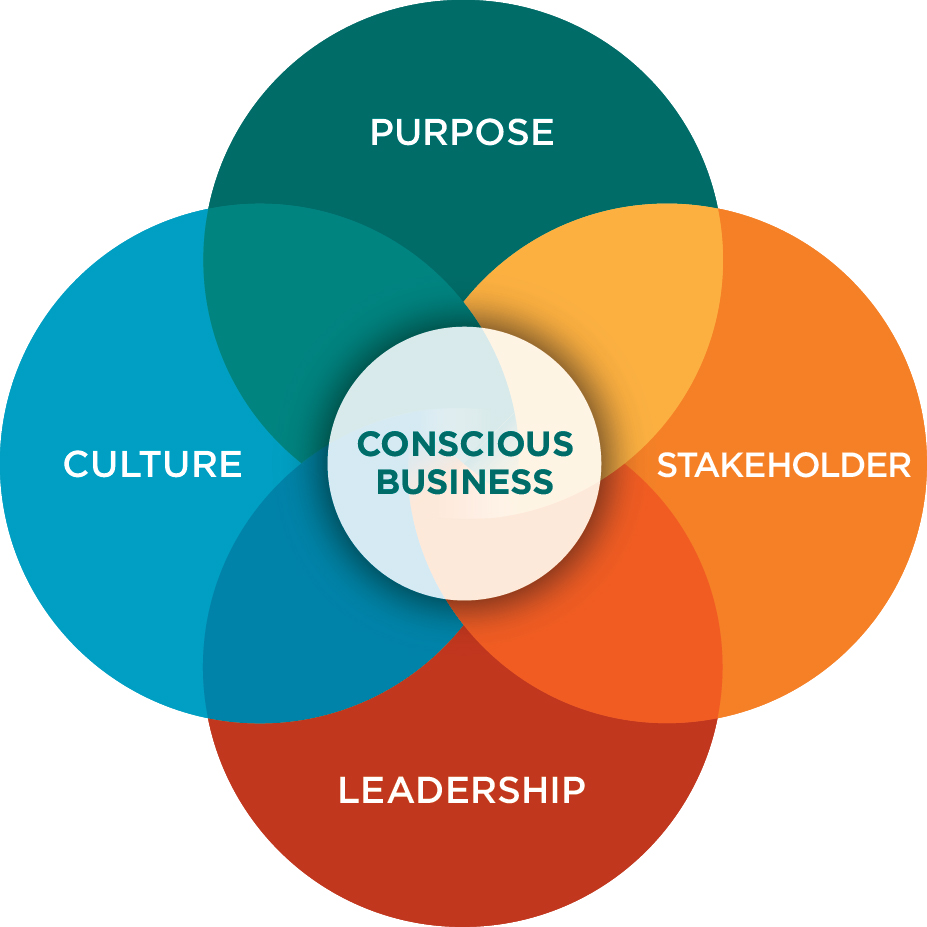In many respects, Conscious Capitalism is a reflection of the same emerging evolutionary process and cultural movement underlying Conscious Connection Magazine. This emerging movement builds on the incredible accomplishments of science, technology and culture, and, recognizing unintended and often harmful effects of human activity, essentially says “we can do better!” We can accentuate the positive, life-enhancing and address and reduce the negative, life-threatening effects.
Arguably the most successful and powerful form of human social cooperation ever conceived, business plays a pivotal and perhaps leading role in this emerging evolutionary process. Conscious Capitalism exists to elevate humanity through business.
While the implications Conscious Capitalism extend beyond business – to address larger social, economic and political infrastructures – the principle focus of Conscious Capitalism, Inc. and the domain in which Conscious Capitalism comes to life, is in the context of business.
Conscious Capitalism, Inc. – a non-profit organized to advance the practice of Conscious Capitalism – articulates four pillars guiding and underlying a business that practices Conscious Capitalism. These are Higher Purpose, a Stakeholder Orientation, Conscious leadership and Conscious Culture.

Higher Purpose
Every business has a purpose beyond making money. In the words of Ed Freeman, “We need red blood cells to live (the same way a business needs profits to live), but the purpose of life is more than to make red blood cells (the same way the purpose of business is more than simply to generate profits).”
Human beings are motivated by meaning. By focusing on its Higher Purpose, a business inspires, engages and energizes its stakeholders (employees, customers and others).
A Conscious Business uses its purpose as a guide to its decisions and actions. For instance:
The purpose of Southwest Airlines: We exist to connect people to what’s important in their lives through friendly, reliable, and low-cost air travel.
When confronted with the question “do we charge for baggage?” it was easy for Southwest airlines to answer “No” while almost all other airlines began charging for baggage. Why? Because they pursue their purpose to deliver low-cost travel, they couldn’t charge for bags.
“The things you can’t buy are dedication, devotion, loyalty—the feeling that you are participating in a crusade,” Kelleher also observed. “Do your employees feel as though they are participating in a crusade? Do they have a sense of purpose beyond receiving a paycheck twice a month?”
The purpose of Patagonia: Build the best product, cause no unnecessary harm, use business to inspire and implement solutions to the environmental crisis.
This deeply embodied purpose drives Patagonia to continually work on elevating their raw material sourcing to reduce the environmental impact of their products. They transparently report on their sourcing through the Footprint Chronicles, accessible on their web site. And they repair customers’ old garments, rather than push sales of new garments.
Stakeholder Orientation
Business is generally perceived as some sort of machine. You apply labor, capital, technology on one end, and profits come out the other end.
Since business is a human social organization, it is more like an ecosystem, with interdependent stakeholders (customers, employees, vendors, investors, communities, natural ecosystems). Like the life forms in an ecosystem, healthy stakeholders lead to a healthy business system. Conscious Businesses focus on creating value for all of their stakeholders.
As Herb Kelleher understood, “A motivated employee treats the customer well. A customer is happy so they’ll keep coming back, which pleases the shareholder. It’s just the way it works.”
Many Conscious Businesses put their customers first. Others, like The Container Store, put their employees first, reflecting Kelleher’s observation. Ultimately, they all look to create value and to engage in real relationships with all of their stakeholders. And, recognizing that the foundation of all life and, thus, of all business, they pay attention to the long-term health of the planet.
Conscious Leadership
In the words of John Quincy Adams, “If your actions inspire others to dream more, learn more, do more and become more, then you are a leader.”
A conscious leader reflects on and recognizes her strengths and weaknesses, senses the effects of her actions on others and their effects on her and each other, and responds to the changing landscape of the environment in which her organization exists. She inspires, guides and facilitates movement animated by a common purpose. She is committed to ongoing learning, growth and development, for herself, the members of her organization and the organization as an entity in itself, and to bringing purpose to life, through committed action in service to all.
Conscious leaders recognize that “No one can whistle a symphony. It takes a whole orchestra to play it.” (from H. E. Luccock) They focus on facilitating collaboration.
And conscious “leaders keep their eyes on the horizon, not just on the bottom line.” (from Warren Bennis). While they exercise and cultivate focus, they also know their role is to hold a larger, more expanded perspective and to sense what is emerging within their organization and in the greater context. They cultivate awareness, track performance and guide an evolution of principles and practices to respond to a dynamic landscape.
Conscious Culture
In the words of Walter Robb, co-CEO of Whole Foods Market, “Culture is kind of ‘how we do things around here.’”
Culture is the embodied values, principles and practices underlying the social fabric of a business, which permeate its actions and connects its stakeholders to each other and to the company’s purpose, people and processes. Culture is glue that connects people to each other and to a company.
Many consider culture to be soft, squishy and hence a secondary concern for business leaders. But in reality culture is probably the most powerful contributor to a company’s competitive advantage. Culture is the unique DNA of a company and no two companies have identical cultures, the same way that no two people have the same fingerprints.
Competitors can copy your products or your trade dress or your promotional strategy, but they can never replicate your culture. The most sustaining competitive advantage a company has is a deep, rich, powerful, values-driven culture.
The Bottom Line on Conscious Capitalism
These four core principles of Conscious Capitalism form a dynamic, every-evolving integrated system. There is no clear Most Conscious Business and no final destination. Being a Conscious Business, or a Conscious Leader, is an ongoing process of becoming.
By focusing on our individual and collective awareness, learning, growth and development, we can continually elevate our functioning, the net effects of our businesses and, in the process, humanity.




